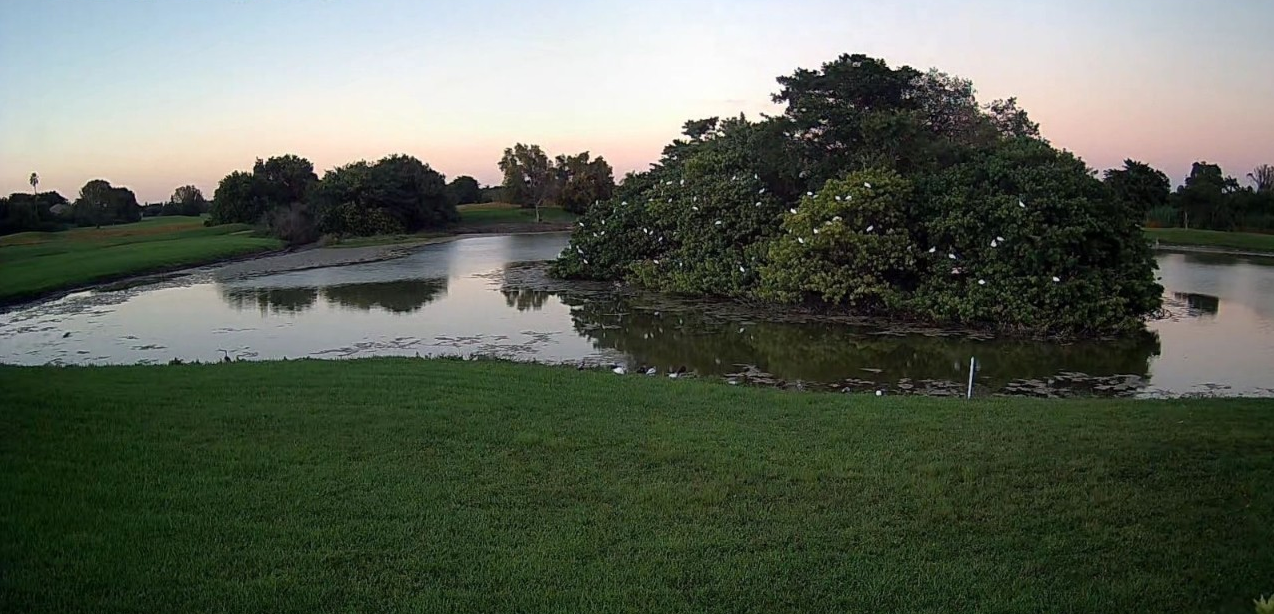
Photo provided by Amanda Prieto

Audio By Carbonatix
In a wild victory for the animal-loving residents of the Calusa neighborhood in West Kendall, a Florida appeals court ruled that Miami-Dade County leaders didn’t properly notify the community of a public meeting and that their rezoning of a contentious piece of golf course land is quashed.
Resident activists with the nonprofit group Save Calusa have fought for years against a proposed large-scale residential development on the land of the now-defunct Calusa Golf Course.
Neighbors contend that the land, which is being developed by GL Homes and Facundo Bacardí of Bacardí Rum fame, is home to a host of imperiled species including the endangered Florida bonneted bat and the threatened tricolored heron.
Last December, the group’s organizer, Amanda Prieto, sued Miami-Dade County in circuit court over the county commission’s meeting and vote to rezone the golf course to allow for the development of 550 homes, as opposed to the approximately 32 houses allowed under the original zoning.
Prieto alleged that the county did not give proper notice of the meeting to the public under Florida’s open government law and the county code, because the commission rescheduled the meeting without publishing a new notice in local newspapers. Prieto also claimed that mailers sent to residents in the area had the wrong developer’s name.
On November 16, Florida’s Third District Court of Appeal sided with Prieto, finding that the county’s notice of the rescheduled meeting was insufficient, therefore making the rezoning is void.
“Allowing the decision to stand threatens to compromise the due process the regulatory framework strives to afford. Accordingly, we grant the petition for certiorari and quash the order under review,” the court wrote in an opinion attached at the end of this article.
A lower court previously sided with the county and said Prieto did not have standing to sue, but the Third District disagreed.
Miami-Dade County attorney Dennis Kerbel did not respond to a phone call and two emails from New Times requesting comment.
The county now has the option to appeal the decision to the Florida Supreme Court, or simply hold a new meeting on the zoning matter, according to Save Calusa attorney David Winker.
“Until something changes, the development project is now delayed,” Winker says. “I think the court recognized the importance of public participation. The reason we have these laws is we all agree the best decisions come when everyone’s at the table.”
Prieto tells New Times that the court’s decision marks a major victory for public participation and allows her group to provide substantial evidence of threatened species activity on the golf course land.
The county approved the rezoning in November of 2021, before the nesting season of several bird species that use a large tree on the property as a “rookery,” or nesting area.
In the intervening months, photographers with Save Calusa documented evidence of the state-threatened tricolored heron nesting within the roots of the rookery.
The county’s Division of Environmental Resources Management (DERM) confirmed the nonprofit’s observations in an August 2022 memo after the lawsuit was filed.
“The state-listed threatened tricolored heron was observed on the island in breeding plumage during eleven out of the twelve surveys,” DERM wrote. “A total of four fledgling tricolored herons that had not been previously observed were seen during the July 27, 2022, survey.”
County Mayor Daniella Levine Cava followed DERM’s findings with her memorandum to the commission stating that the developer, GL Homes, must submit a development plan that protects the rookery and preserve wildlife.
Armed with these studies and the mayor’s support, and now facing a new slate of county commissioners after the midterm election, Prieto feels her organization has a greater chance to fight the 550-home plan and maintain much of the property as environmental land.
“This feels so rewarding because it means we were right all along, and the community can be at the table. The moral of the story is: get involved. We can make a difference,” Prieto says.